How To Treat Acne Naturally?
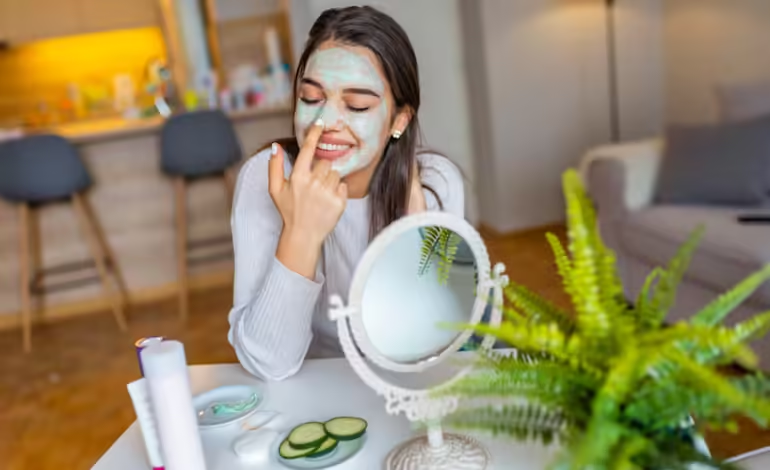
Acne is very common, affecting about 85% of young adults. Medicines like salicylic acid or benzoyl peroxide work, but they can be costly. Also, they may lead to dry skin, redness, and irritation. Because of this, a lot of people look for natural remedies to treat acne at home. A study from 2017 showed that 77% of acne patients tried alternative treatments.
Key Takeaways
- Acne is a common skin condition affecting 85% of young adults.
- Conventional acne treatments can be expensive and cause side effects.
- Many people are turning to natural remedies to treat acne at home.
- Natural remedies can be an effective and affordable alternative.
- A 2017 study found that 77% of acne patients had tried alternative treatments.
Understanding Acne
Acne is very common and shows up when skin pores get blocked with oil and dead cells. Each pore links to a sebaceous gland that makes sebum. Extra sebum and dead cells block the pores, letting bacteria like P. acnes grow fast.
Also Read : What Is The Best Skincare Routine For Oily Skin?
What is Acne?
It’s a skin problem that makes pimples, blackheads, and whiteheads. These happen when pores can’t let out sebum well, causing swelling and acne spots.
Also Read : How Does A Night Routine Benefit Your Skin Care Regimen?
Causes of Acne
Acne comes because the skin makes too much sebum and builds up dead cells. Bacteria like P. acnes play a role. Hormones, some drugs, stress, and what we eat can also lead to acne.
Also Read : Affordable Skin Care Products For All Skin Types And Budgets
Types of Acne
There are many acne types, such as:
- Whiteheads (closed comedones)
- Blackheads (open comedones)
- Papules (small, inflamed bumps)
- Pustules (pus-filled pimples)
- Nodules (large, hard, painful lumps beneath the skin)
- Cysts (painful, pus-filled lesions that can cause scarring)
The kind of acne someone has depends on their skin and how bad it is.
It’s important to know what causes and types of acne for the right treatment. This could be healing at home, store-bought stuff, or seeing a doctor for medicine.
Also Read : Crafting Your Perfect Skin Care Routine: Essential Steps For Radiant Skin
Natural Topical Remedies

Many people use natural options to help with acne. Apple cider vinegar, tea tree oil, honey, and aloe vera are popular choices. These items can calm skin, stop bacteria, and support clearer, healthier skin.
Also Read : Unlock Your Glow: Essential Skin Care Tips For Radiant Complexion
Apple Cider Vinegar
Apple cider vinegar is a common natural fix for skin issues, including acne. Its acetic acid can dry pimples and lower inflammation. It also balances the skin’s pH. You can try a mix of vinegar and water as a toner or dab it on pimples with a cotton ball.
Tea Tree Oil
Tea tree oil is famous for fighting bacteria and inflammation, making it good for acne. You can apply a little directly on pimples or mix it with a carrier oil. It may reduce redness and swelling and stop acne bacteria from growing.
Honey and Cinnamon Mask
A mix of honey and cinnamon can be great for acne. Honey fights bacteria and reduces swelling. Cinnamon helps dry pimples and control oil. Mix honey and cinnamon, apply, leave on for 10-15 minutes, then rinse.
Aloe Vera Gel
Aloe vera is great for soothing and hydrating skin, especially if you have acne. It reduces redness and might prevent breakouts. Using aloe vera can feel cool and can heal blemishes faster.
Dietary Supplements
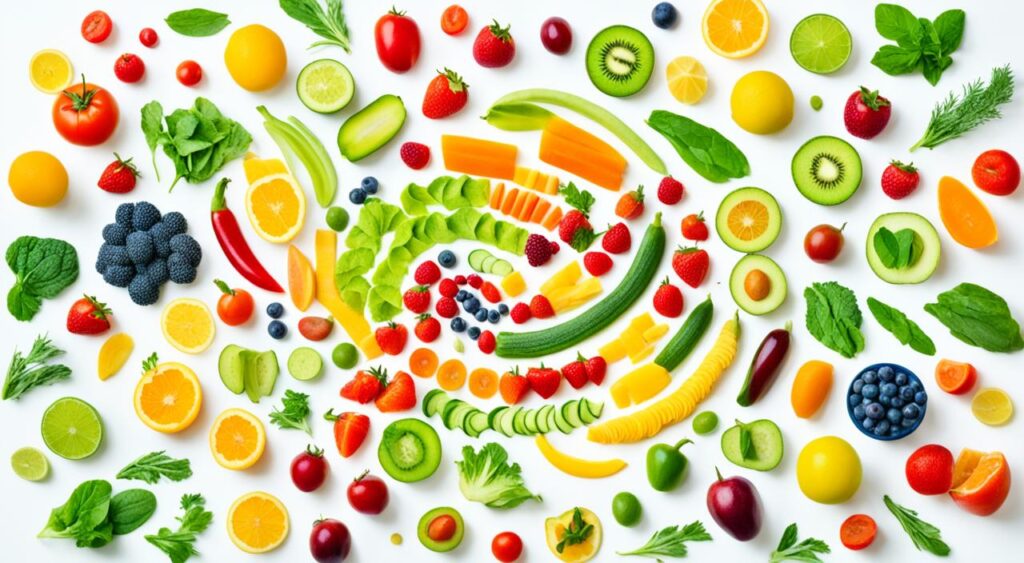
Some dietary supplements can also help with acne. Zinc and green tea extract are two that look promising.
Zinc Supplements
Zinc is key for your skin and immune system. People with acne often have less zinc in their blood. Adding zinc may cut down inflammation, control oil, and stop acne bacteria. Adults should aim for 8-11 mg daily, but up to 30 mg could help with acne.
Green Tea Extract
Green tea extract is full of antioxidants like EGCG. These can fight inflammation and bacteria. Green tea extract has shown it could lower oil production, fight bacteria, and cut down on swelling. It’s recommended to take 250-500 mg each day for acne.
Using dietary supplements such as zinc and green tea extract in your daily plan may help. This can make your skin health and your acne treatment better.
Herbal Remedies
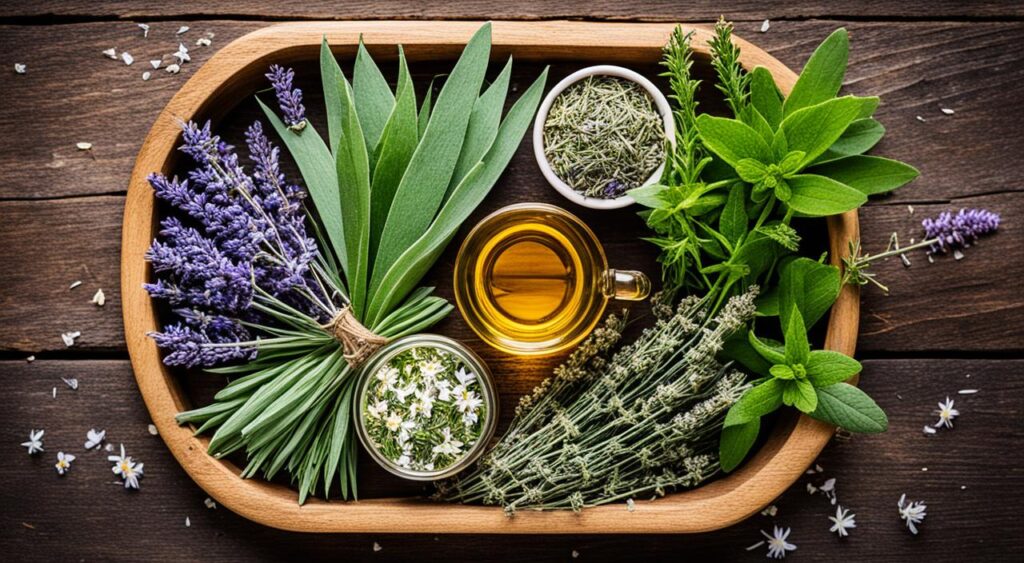
Herbal remedies are known for their impact on acne. They often contain good bacteria fighters and swelling reducers. This nature-based approach directly targets acne causes.
Turmeric
Turmeric is a bright yellow spice, famous for its natural power. In particular, it fights inflammation and harmful acne bacteria. The reason is curcumin, its main healing component. Curcumin not only calms down acne but also stops the bacteria from growing.
Witch Hazel
Witch hazel comes from a special plant and has a long history. It’s well known for its bacteria fighting and swelling reducing abilities. These qualities help clear up acne by cutting down redness, swelling, and too much oil.
Echinacea
Echinacea is a beautiful, immune system boosting plant common in North America. It is also a strong fighter against inflammation. Recent findings show that Echinacea doesn’t like acne-causing bacteria either. This makes it a great part of any natural acne treatment plan.]]>
Lifestyle Changes

Adding natural topical treatments and supplements isn’t the only way to fight acne breakouts. Changing certain aspects of your lifestyle can also make a big difference. This includes improving your skincare routine, learning about stress management, and staying on top of hydration.
Avoiding Pore-Clogging Products
Choosing the right products for your skin is critical. Pore-clogging products like heavy creams, oils, and some makeup can make acne worse. They do this by trapping oil and skin cells in your pores. Look for oil-free, non-comedogenic items to help keep your skin clear.
Managing Stress
Stress is a big deal for skin health. It ramps up the production of certain hormones that make your skin oilier, leading to acne. Combat stress with activities like meditation, yoga, or simply exercising. Your skin will thank you.
Staying Hydrated
Keeping your skin healthy starts with being hydrated. When you’re dehydrated, your skin can overproduce oil, leading to acne. Drink lots of water every day. Also, eat hydrating foods such as fruits and veggies. This will keep your skin from breaking out.
Acne
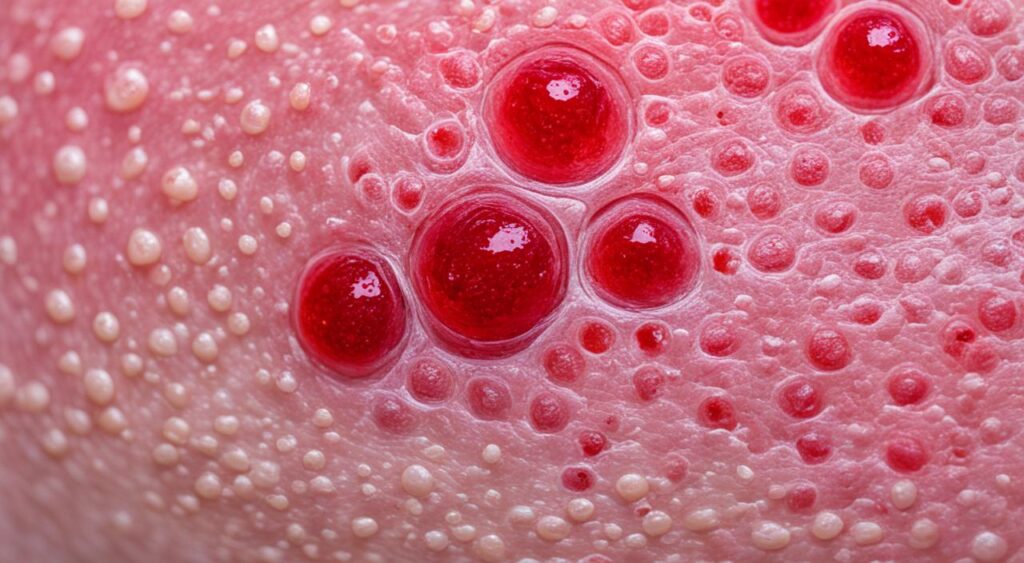
Acne is a common skin issue caused by clogged skin pores. The clogs are from oil and dead skin cells. This then invites bacteria to grow more, leading to pimples, whiteheads, blackheads, and even cysts. Acne affects people of all ages.
Many things can cause acne. This includes things like hormonal changes and too much oil on the skin. It’s important to know about these issues to deal with acne better.
There are many ways to treat acne. Some people use creams or medications. Others use natural methods. It’s about finding what works best for you. This helps keep your skin clear and healthy.
Over-the-Counter Treatments
This article talks about using natural methods to treat acne. But remember, there are great over-the-counter acne products too. You can find these treatments in stores easily and they’re not too expensive. For people with light to medium acne, these products can be a big help. They include:
Benzoyl Peroxide Cleansers
Over-the-counter acne treatments often have benzoyl peroxide. This ingredient fights the P. acnes bacteria that causes acne. It also helps clean out your pores. Benzoyl peroxide comes in different strengths, from 2.5% to 10%. You can get it as a face wash, cream, or spot treatment.
Salicylic Acid Products
Salicylic acid is in many over-the-counter acne treatments. It’s good at keeping your skin clear by getting rid of dead skin cells and opening up your pores. You can find it in toners, serums, and spot treatments, and it’s great for treating blackheads and whiteheads.
Sulfur Spot Treatments
People have used sulfur to treat acne for a long time. Spot treatments with sulfur in them can help dry up and heal pimples and blemishes fast.
Always read and follow the instruction for each over-the-counter acne treatment. Start with weaker products to see how your skin reacts. By adding these products to your daily skin care, you could see your skin improve a lot.
When to See a Dermatologist
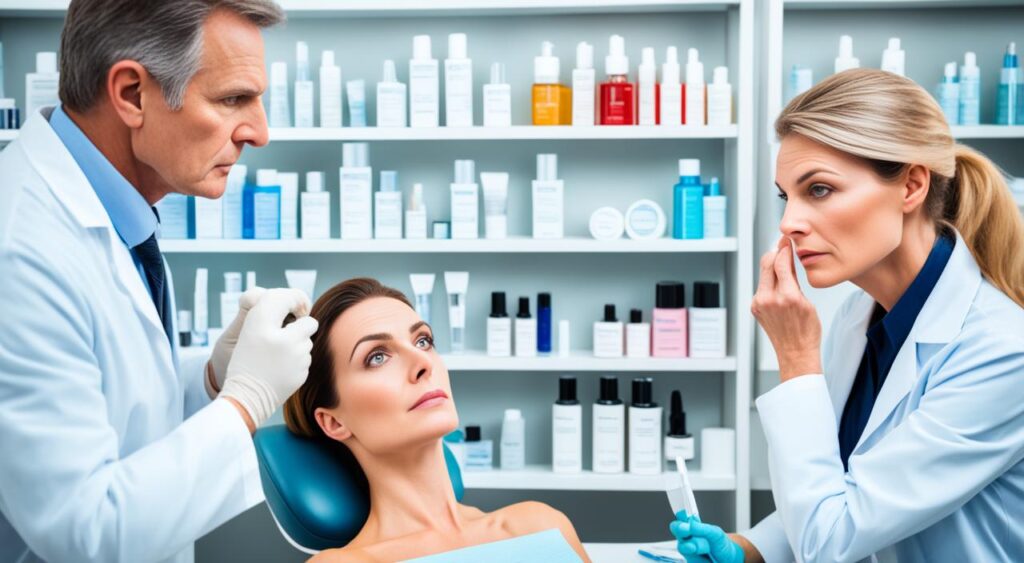
Though home remedies can work, some acne cases need a dermatologist. This is especially true if:
- You have severe acne with widespread, cystic, or nodular breakouts that are not responding to home treatments.
- Your acne is causing significant physical or emotional distress, such as scarring, low self-esteem, or depression.
- You need prescription medication to manage your acne, such as oral antibiotics, retinoids, or hormonal therapies.
- You have tried various over-the-counter treatments but are still struggling with persistent or recurring acne breakouts.
A dermatologist can analyze your situation detailedly and tailor a plan for your acne. They can use prescription medications and special treatments that home remedies can’t match.
Partnering with a dermatologist helps you control your acne and avoids lasting damage. If your acne is serious or not improving with what you tried at home, do consider professional advice.
Preventing Acne Scarring
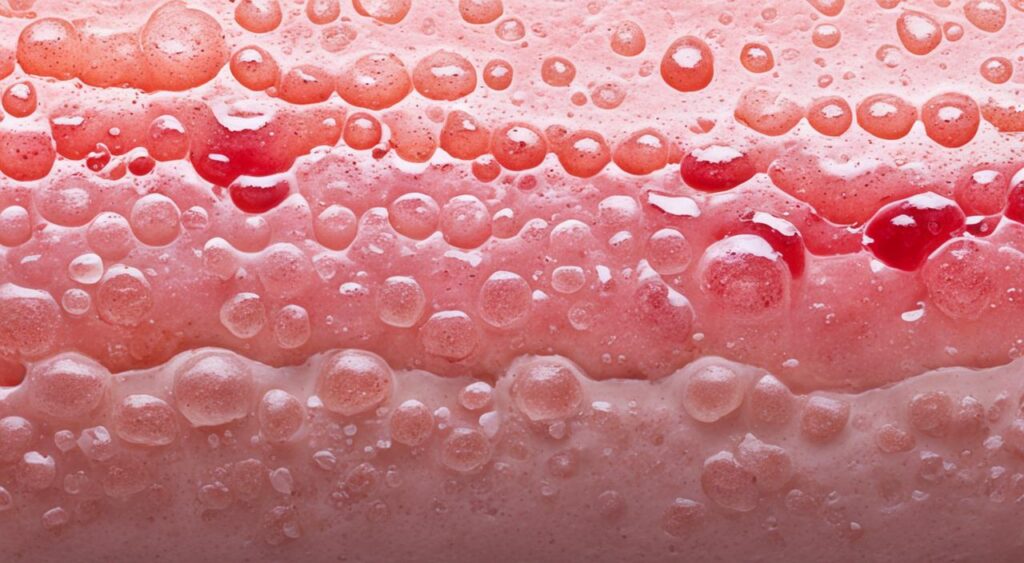
Acne doesn’t just impact your skin at the moment; it can lead to long-lasting issues like acne scarring and hyperpigmentation. By focusing on prevention, you can cut down on these future skin concerns. A solid skin care routine is key, reducing the chances of acne causing scarring and discoloration.
To prevent acne scarring, steer clear of picking at your skin or using harsh exfoliants. Doing so can make things worse, causing more inflammation and increased scarring. Instead, opt for a gentle face wash, non-comedogenic moisturizers, and products with benzoyl peroxide or salicylic acid. These can help manage breakouts without damaging the skin.
It’s also a great idea to add antioxidant-rich items like vitamin C and retinoids to your routine. They can lighten existing discoloration and enhance the skin’s overall look. Don’t forget to use sunscreen daily. Sunlight can make hyperpigmentation worse and damage acne scars.
For more profound acne scarring issues, considering professional treatments might be the best step. Treatments like chemical peels, microneedling, or laser therapy could be very beneficial. They work to smooth skin, reduce pits, and balance out skin tone.
When dealing with acne, it’s crucial to take a full strategy towards prevention and scarring management. Doing so can handle both immediate breakouts and their lasting effects. This aim leads to a skin that’s not just clearer but also more glowing.
Myths and Facts About Acne
Acne myths and facts often confuse people who are looking for ways to treat it. It’s crucial to know the facts about acne. This helps us tackle this common skin health problem the right way.
| Myth | Fact |
|---|---|
| Acne is caused by poor hygiene. | Acne comes from things like too much oil, blocked pores, germs, and hormonal changes. Washing your face well is important. But, scrubbing too hard can make acne worse. |
| Popping pimples helps clear acne faster. | It’s not a good idea to pop pimples. Doing so can spread germs and make more pimples. It also increases the chance of leaving a scar. |
| Chocolate and greasy foods cause acne. | Science doesn’t strongly link chocolate or greasy foods to acne. Yet, eating healthy helps your skin look and feel better. Try to eat less processed and sugary foods to see if it helps. |
| Tanning clears up acne. | Getting a tan might hide some acne at first. But, the sun can make your skin more irritated over time. It leads to wrinkles and other problems. Using treatments that fight acne’s causes is a better idea. |
| Acne only affects teenagers. | Many adults also struggle with adult acne. It can happen because of changing hormones, stress, or certain drugs. |
Learning the acne facts and clearing up acne myths helps us choose better skin care and acne treatments. This way, our skin stands a better chance of being healthy and clear.
Specific Types of Acne
Acne is often linked with the teenage years but can happen at any point in a person’s life. It takes different forms and has special causes. Some kinds of acne are:
Adult Acne
Known as persistent acne, adult acne is quite common. It affects those in their 20s, 30s, and even 40s. It ties back to hormonal changes, stress, and some drugs. This kind of acne appears as inflamed spots on the face, chest, and back.
Hormonal Acne
Acne influenced by hormone shifts is called hormonal acne. It shows up during puberty, periods, pregnancy, or when hormones are imbalanced. You might see it on the chin, jawline, or lower face. This acne type can be tough to treat with regular methods.
Pregnancy Acne
Being pregnant can cause a spike in hormones, which leads to pregnancy acne. It’s more common in the first and second trimesters. The breakouts happen mostly on the face, chest, and back. Using gentle skincare and avoiding strong products helps handle it.
Also read: 8 Signs Of Unhealthy Skin
Conclusion
Acne is a common skin condition that affects many people. Some find relief in natural acne treatments to avoid harsh effects from conventional medicine. These natural remedies include apple cider vinegar and tea tree oil. They also involve dietary supplements and herbal solutions. These can help with acne management and improve skin health.
Creating a good skincare routine and changing your lifestyle can help prevent acne. This means not using products that clog your pores, reducing stress, and drinking enough water. Even though natural treatments might not help everyone, they are a kinder option. It’s a good choice for those looking for alternatives to standard acne drugs.
Success in dealing with acne comes from knowing its causes and trying different natural acne treatments. It also includes getting advice from a dermatologist when needed. With a full strategy in place, people can better control their skin health. They can move closer to achieving the clear skin they want.
FAQs
What is the main cause of acne?
Acne starts when the skin’s pores get blocked by oil and dead skin cells. This blockage makes a perfect place for more bacteria to grow. The bacteria, called Propionibacterium acnes (P. acnes), cause the area to get inflamed. This is how whiteheads, blackheads, and pimples appear.
What are some natural topical remedies for acne?
You can try apple cider vinegar, tea tree oil, and even honey and cinnamon on your face. Aloe vera gel is also great. These things are good because they reduce swelling and kill harmful bacteria.
Which dietary supplements can help improve acne?
Taking zinc and green tea extract might help make your skin better. They work because they stop damage and reduce swelling.
What are some effective herbal remedies for acne?
Herbs like turmeric and witch hazel can fight bacteria and help your skin not be as red. Echinacea also helps keep the skin calm.
What lifestyle changes can help prevent and manage acne?
To keep your skin clear, avoid things that could block your pores. It’s also important to relax and drink plenty of water. These simple steps can go a long way in keeping your skin healthy.
What are some over-the-counter acne treatments?
Lots of cleansers and creams can be bought without a doctor’s note. They often have ingredients like benzoyl peroxide to kill bacteria, salicylic acid to open pores, or sulfur to dry up oily spots.
When should someone see a dermatologist for acne?
Seeing a skin doctor is important if your acne just doesn’t seem to get better. This is especially true if it’s really bad or if it’s making you feel not so good.
How can acne scarring be prevented?
To stop scarring, treat your acne as soon as you can. There are also special products you can use to make scars less visible.
What are some common myths about acne?
Some people think not washing your face well enough causes acne or that it’s just for teenagers. Others believe certain foods always lead to acne. But, the truth is more complicated. It’s good to know the facts about acne.
What are some specific types of acne?
There’s adult acne, hormonal acne (which affects more women), and even acne that happens only when you’re pregnant. They all need different kinds of care.
